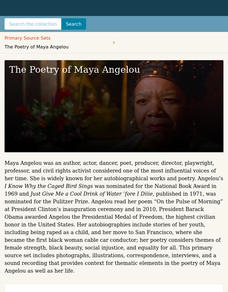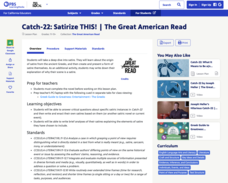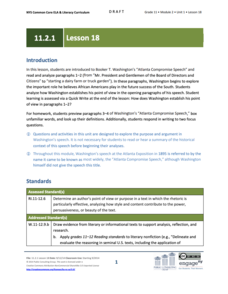Digital Public Library of America
The Poetry of Maya Angelou
Maya Angelou's work reflects her passion for life, civil rights, and justice for all. A collection of 12 primary sources provide scholars with insight into this amazing woman. The set includes photographs, articles, recordings of...
Royal Shakespeare Company
King Lear Teacher Pack 2010
Every production of Shakespeare's plays is different—the director and designer must decide upon a theme. For his 2010 production, David Farr and his team decided to emphasize the conflicts that follow a regime change. The materials in a...
Royal Shakespeare Company
King Lear Teacher Pack 2016
Disguises, deceptions, destruction. Thankless children, wise fools, aging rulers, and knaves. The Royal Shakespeare Company's 2016 King Lear Teacher Pack provides instructors with a wealth of resources for a study of Shakespeare's famous...
Facing History and Ourselves
Literature and Imagination Make Democracy Work
The final lesson in the "What Makes Democracy Work?" series examines the connections between imagination, literature, and democracy. Class members listen to a podcast, read an excerpt from Azar Nafisi's, The Republic of Imagination, and...
Literacy Design Collaborative
Rhetorical Analysis: A Modest Proposal
Scholars read Jonathan Swift's A Modest Proposal before writing essays to analyze the use of rhetorical devices in the text. Essay writing begins by underlining key words in the writing prompt and discussing the prompt with...
PBS
Exploring the Drive to Create in Frankenstein
Is it hubris that drives the creative process? Is it the desire to be remembered long past death? An interactive asks readers of Mary Shelley's novel Frankenstein and Percy Shelley's poem "Ozymandias" to consider what this wife and...
PBS
Symbolism and the Use of “New Language” in The Handmaid’s Tale
Words matter. Words frame thought. Words are symbolic. Readers of Margaret Atwood's The Handmaid's Tale examine how the words In Gilead's "New Language" reinforce the power of the government and provided insight into the symbolic level...
PBS
Exploring First-Person Narrative
If you really want to know, this is a terrific lesson all about narratives, which is just a fancy way of saying telling stories. And you get to do it without being phony or anything. My favorite part is that you get to read a passage...
PBS
Satire, Parody, and Humor in Catch-22
Laughter is the heart of dark comedy. It makes the unbearable bearable. Joseph Heller crafted his dark comedy Catch-22 to enable readers to laugh at the painful realities and underscore the absurdities of a war where people you...
PBS
Catch-22: Satirize This!
Some assignments are great, some can become great, and some have greatness thrust upon them. This one is great. After completing Joseph Heller's classic satire, Catch-22, groups craft and present their own political satire.
PBS
Shifting Perspectives in Toni Morrison's Beloved
An interactive provides readers with an opportunity to record their reactions to Beloved, Toni Morrison's powerful narrative based on the life of Margaret Garner. Prompts ask them to consider how the shifting point of view contributes to...
PBS
Catch-22: What It Means to Be a(n Anti)Hero
Catch-22, Joseph Heller's send-up of military organizational bureaucracy, provides readers with an opportunity to consider the importance of the anti-hero. Class members fill out a worksheet comparing and contrasting the qualities...
EngageNY
Grade 11 ELA Module 2: Unit 1, Lesson 13
Some words leave a lasting impact. After reading paragraph 11 of the text "Of Our Spiritual Strivings," scholars closely examine how Du Bois describes the impact prejudice left on the African American community. They discuss the...
EngageNY
Grade 11 ELA Module 2: Unit 1, Lesson 26
Add all of the pieces to complete the puzzle. Scholars apply their knowledge from the past 25 lessons to an end-of-unit writing assignment. Pupils write multi-paragraph essays comparing the author's point of view and use of rhetoric in...
EngageNY
Grade 11 ELA Module 2: Unit 1, Lesson 24
You can never be too prepared. Scholars begin preparing for the end-of-the-unit assessment of Du Bois’s "Of Our Spiritual Strivings" and Washington’s "Atlanta Compromise" speech. They use peer discussion to discuss the relationship...
EngageNY
Grade 11 ELA Module 2: Unit 1, Lesson 23
Work together for the higher good. Scholars look at paragraph 10 in the "Atlanta Compromise" speech in which Washington pledges African American cooperation. Readers determine the connection between two central ideas and how they build...
EngageNY
Grade 11 ELA Module 2: Unit 1, Lesson 22
Say precisely what you mean. Scholars analyze the importance of Washington's precise language in paragraphs eight and nine of the "Atlanta Compromise" speech. They interpret his figurative language and add it to their Idea Tracking...
EngageNY
Grade 11 ELA Module 2: Unit 1, Lesson 21
Is there power in persuasion? After reading paragraphs six and seven of Booker T. Washington's "Atlanta Compromise" speech, learners look at how Washington uses rhetoric and carefully planned word choice to add to the persuasiveness of...
EngageNY
Grade 11 ELA Module 2: Unit 1, Lesson 20
Scholars analyze the fifth paragraph of Booker T. Washington's "Atlanta Compromise" speech. They learn more about his point of view toward color as he addresses the "white race." Pupils review their Idea Tracking Tools in pairs, answer...
EngageNY
Grade 11 ELA Module 2: Unit 1, Lesson 19
Scholars look at paragraphs two and three in the "Atlanta Compromise" speech. They analyze how Washington uses a story about a ship lost at sea and rhetorical devices to develop his point of view. After class discussion and completing...
EngageNY
Grade 11 ELA Module 2: Unit 1, Lesson 18
America's success depends on everyone. Scholars examine the first two paragraphs of Booker T. Washington’s "Atlanta Compromise" speech. They work in groups to answer questions and discuss Washington's perspective on African Americans'...
EngageNY
Grade 11 ELA Module 2: Unit 1, Lesson 17
Scholars enter the midpoint of the unit and connect all the previous 16 lessons about the text "Of Our Spiritual Strivings." They complete a Mid-Unit Assessment that requires a multi-paragraph response to a writing prompt.
EngageNY
Grade 11 ELA Module 2: Unit 1, Lesson 16
Take a second look. Scholars examine the chapter "Of Our Spiritual Strivings" as a whole and once again work in groups to discuss Du Bois's use of figurative language. They also complete the Mid-Unit Assessment Evidence Collection Tool...
EngageNY
Grade 11 ELA Module 2: Unit 1, Lesson 8
Was freedom really free? Scholars analyze paragraphs six and seven of Du Bois's chapter "Of Our Spiritual Strivings." They look at how the author uses rhetoric to strengthen his point of view about freedom. Learners complete a Rhetorical...

























